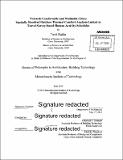Towards comfortable and walkable cities : spatially resolved outdoor thermal comfort analysis linked to travel survey-based human activity schedules
Author(s)
Rakha, Tarek
DownloadFull printable version (15.06Mb)
Other Contributors
Massachusetts Institute of Technology. Department of Architecture.
Advisor
Christoph F. Reinhart.
Terms of use
Metadata
Show full item recordAbstract
Outdoor thermal comfort can influence human powered mobility choices, namely walking and biking. As more people are living in cities than ever before in human history, the urban environments we erect and populate are unfortunately contributing to phenomena such as climate change, which is negatively affecting urban life. Our understanding and creation of comfortable environments that are conducive to human powered transport can significantly influence carbon emissions, energy efficiency, and human health, as well as have considerable economic and time saving impacts. With the continuous integration of computer-based decision support systems in design processes, there is a need for developing simulation frameworks that aid architects, urban designers and planners in making informed sustainable design decisions. The focus of this work, therefore, is the development of computer tools and workflows that promote the design of walkable and bikeable cities through comfortable outdoor spaces. This dissertation presents firstly, a simulation methodology, verified through a validation experiment conducted on the MIT campus, for spatially and temporally resolved Mean Radiant Temperature (MRT) simulation and consequent outdoor thermal comfort assessment. Secondly, Building Performance Simulation (BPS) occupancy and trip schedules generation through data clustering techniques applied to activity-based travel surveys. An office modeling case study is presented through extracted occupancy scenarios, to compare simulation accuracy against current practice standards. Finally, an assimilation of both workflows is presented to generate "Trip Comfort" metrics for human powered mobility assessment, in the context of existing or newly designed urban structures.
Description
Thesis: Ph. D. in Building Technology, Massachusetts Institute of Technology, Department of Architecture, 2015. Cataloged from PDF version of thesis. Includes bibliographical references.
Date issued
2015Department
Massachusetts Institute of Technology. Department of ArchitecturePublisher
Massachusetts Institute of Technology
Keywords
Architecture.